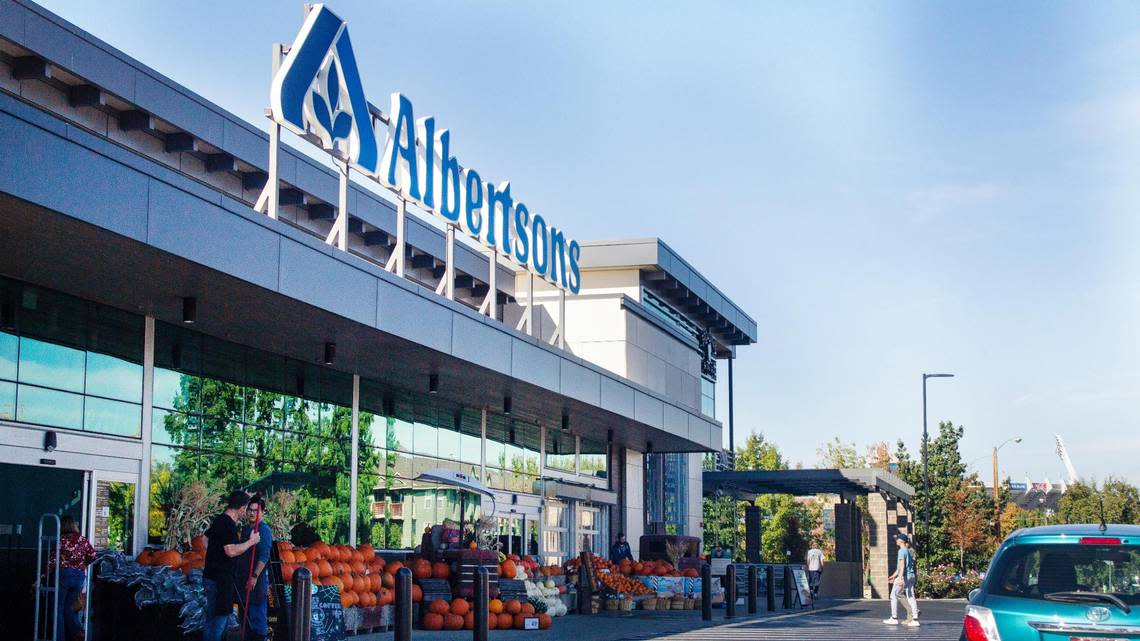Now consumers are suing to block the Kroger-Albertsons merger, too. Here’s what we know

Opposition to a proposed merger between Kroger and Albertsons has taken a new turn after two dozen consumers sued to challenge the $25 billion deal.
The lawsuit, filed Feb. 2 in a California federal court, also seeks to halt a controversial $4 billion dividend by Albertsons to shareholders in the run-up to the merger.
The proposed marriage of Albertsons, the Boise, Idaho, grocery giant that owns Safeway; and Kroger, the parent of Fred Meyer, has been closely watched since its October announcement.
The lawsuit was brought by 25 consumers in 11 states. Federal law allows private suits to enforce antitrust laws.
Kroger makes deal to buy Albertsons. What that means for shoppers, workers, Boise
The plaintiffs contend that the “megamerger” would give the combined companies monopoly power over the U.S. grocery market, which “will be used to increase prices for groceries, decrease the quality of food, eliminate jobs, close stores and offer less choice for consumers.”
The suit also argues that Albertsons’ $4 billion dividend in advance of the merger is intended “to financially cripple Albertsons and to weaken its competitive position relative to Kroger.” The plaintiffs want to bar the payment or force shareholders to give up, or disgorge, any payment they have received.
The suit comes just weeks after the Washington state Supreme Court cleared the way for Albertsons to pay the dividend after state Attorney General Bob Ferguson had asked the court to review the case.
A separate effort to stop the dividend by California, Illinois and the District of Columbia was also turned aside by a federal judge in Washington, D.C.
Update: Albertsons to pay stockholders $4b dividend. Grocer announces when it will happen
An Albertsons spokesperson on Thursday declined to comment on the suit. Kroger did not respond to questions about it. Cerberus Capital Management, which owns about 29% of Albertsons, also did not respond to an inquiry.
The suit claims the merger violates U.S. antitrust law because Albertsons and Kroger are significant rivals in the grocery business. “It’s competition that they are eliminating” through the merger, said attorney Joseph M. Alioto, whose San Francisco firm is one of two firms representing the plaintiffs, according to a Feb. 3 article by Reuters.
The suit is also the first to “directly challenge the merger,” said attorney Joseph Saveri, head of the second firm, in an email to The Seattle Times on Thursday. Saveri noted that the suit by Ferguson focused on the $4 billion dividend.
With Albertsons-Kroger merger, we asked: Whose prices are lower? This is what we found
The suit drew a puzzled response from some observers.
Douglas Ross, an antitrust expert at the University of Washington School of Law, said it’s unclear what the plaintiffs hope to achieve. The Federal Trade Commission and several states are likely to sue to block the merger, so “there wouldn’t seem to be a need for a private lawsuit on top of the governmental lawsuits,” Ross said.
The suit was also criticized for the way it characterizes the grocery market. A Kroger-Albertsons merger would control 36% of the “U.S. grocery supermarket operators,” according to the suit.
But as Daniel Kline, managing editor of TheStreet, pointed out in a Feb. 6 article, groceries are also sold by nonsupermarket operators, such Costco and Walmart, which the suit doesn’t mention.
Albertsons or Fred Meyer? We asked where you prefer to shop and why. Here’s what you said
Amazon alone accounts for about 25% of the grocery market. As a share of total grocery sales, a Kroger-Albertsons merger would control about 13% of the market, according to 2021 data from Euromonitor.
The suit “seems to not be aware that grocery chains don’t just compete with other grocery chains,” Kline said.
Saveri responded that stores like Walmart and Costco “sell other goods,” and that for the purposes of the suit, the list of supermarket operators is “the listing that matters.”
To get federal approval for deal, Kroger and Albertsons must sell off hundreds of locations where the soon-to-be-former competitors have too much market overlap.
5 things to know about Kroger, as it plans to merge with grocery competitor Albertsons
